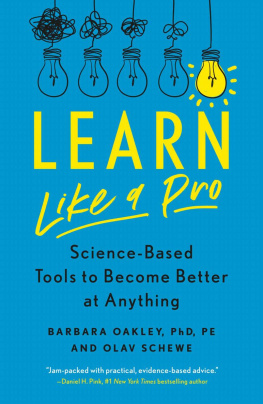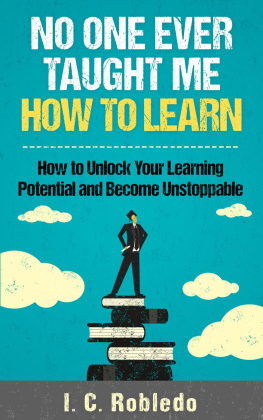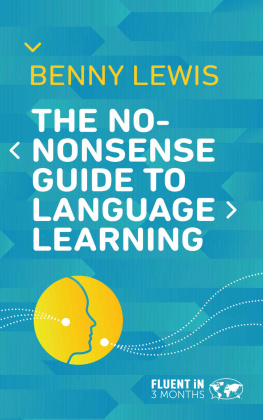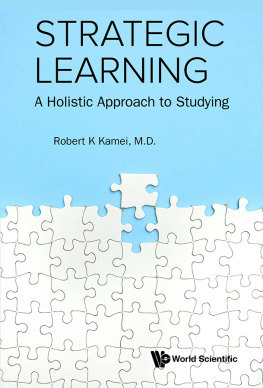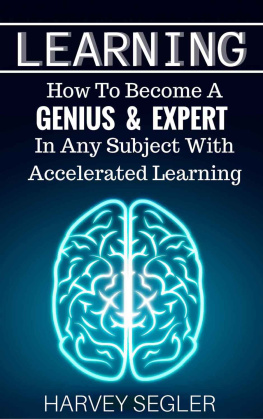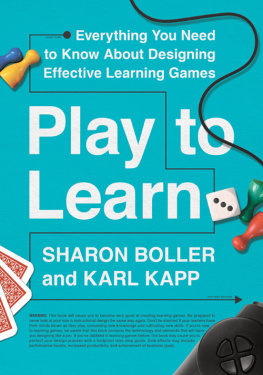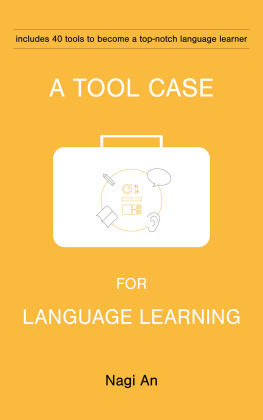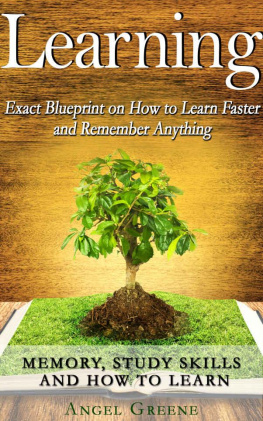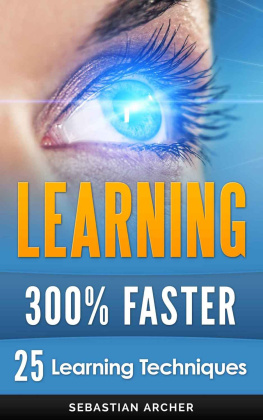The Crowdsourced Guide to Learning
Here you can read online The Crowdsourced Guide to Learning full text of the book (entire story) in english for free. Download pdf and epub, get meaning, cover and reviews about this ebook. genre: Science. Description of the work, (preface) as well as reviews are available. Best literature library LitArk.com created for fans of good reading and offers a wide selection of genres:
Romance novel
Science fiction
Adventure
Detective
Science
History
Home and family
Prose
Art
Politics
Computer
Non-fiction
Religion
Business
Children
Humor
Choose a favorite category and find really read worthwhile books. Enjoy immersion in the world of imagination, feel the emotions of the characters or learn something new for yourself, make an fascinating discovery.

The Crowdsourced Guide to Learning: summary, description and annotation
We offer to read an annotation, description, summary or preface (depends on what the author of the book "The Crowdsourced Guide to Learning" wrote himself). If you haven't found the necessary information about the book — write in the comments, we will try to find it.
( ).Make your learning fun and effective with our free e-book - 60 pages of study tips and expert advice from learners and educators.Contents.
Introduction.
Foreword.
Why Do You Learn?
How Do You Organise Your Learning?
Which Techniques Help You Learn?
How Do You Learn With Others?
What Keeps You Motivated to Learn?
What Makes You a FutureLearner?
Who Contributed?
Unknown: author's other books
Who wrote The Crowdsourced Guide to Learning? Find out the surname, the name of the author of the book and a list of all author's works by series.
The Crowdsourced Guide to Learning — read online for free the complete book (whole text) full work
Below is the text of the book, divided by pages. System saving the place of the last page read, allows you to conveniently read the book "The Crowdsourced Guide to Learning" online for free, without having to search again every time where you left off. Put a bookmark, and you can go to the page where you finished reading at any time.
Font size:
Interval:
Bookmark:
made by learners, curated by futurelearn The design of this guide is Copyright 2015 FutureLearn Ltd. The copyright for tips within this guide remains with the learners who submitted them. Some tips have been edited for length, sense or consistency. Where a tip contains content from a third party, for example a quote, we have, where possible, attributed it to that party. No copyright infringement is intended. DESIGN TIP Only read the words highlighted in yellow for a s ummary of this guide.
Contents Introduction foreword Why do you learn? How do you organise your learning? Which techniques help you learn? How do you learn with others? What keeps you motivated to learn? What makes you a FutureLearner? who contributed? Introduction In April 2015, FutureLearn invited people around the world to share their top study tips with us, to create The Crowdsourced Guide to Learning. We asked them why they start and continue to learn; how they organise their study and remember what theyve learnt; how they learn from and with other people; and what role learning plays in their lives. We received hundreds of tips. Many were motivational, many were organisational and some were simply bizarre. What we learnt is that while there are tried and tested methods for learning effectively, everyone has their own idiosyncrasies and habits that help them achieve their goals. So in this guide, we try to showcase both our favourite tips from learners and expert advice from the academic and online learning community.
Wherever you are on your learning journey, we hope youll find something to inspire, inform or surprise. Happy learning! Professor Mike Sharples, The Open University Foreword We learn by making connections. At the biological level, the connections are between neurons, which grow stronger whenever we have a new experience. At the mental level, the connections form between concepts, when we associate one idea with another by memorising, or by experiencing how objects and actions relate. And at the social level, the connections take the form of conversations, as we meet people and share ideas. The surprising fact is that we dont need to push ourselves to make these connections - they come naturally.
We cant help learning. We do it all the time, when we take in something new, or respond in a different way to people or surroundings. So why does learning often seem so hard? Usually, it comes from trying to control that natural process, when we have to force ourselves to learn particular topics, such as revising for exams, or when we are told to learn specific facts and figures. The brain does not store items like a filing cabinet, so forcing ourselves to remember disconnected facts is not a natural way to learn. Setting up the conditions to learn We need to set up the conditions for making good connections. Usually, that means being relaxed and alert, so that our minds are focused on the immediate experience, setting achievable goals for ourselves, and being in a rich environment where there are plenty of opportunities to make relevant connections.
That could come from exploring a new city and meeting people, or from reading a good book or watching a stimulating video. For example, a good way to learn a foreign language (if you arent able to live in the country or talk with native speakers) is not through trying to remember individual words, but by watching videos with subtitles. The more we enjoy the process of learning, the more we make rich and appropriate connections. What makes us different to other animals is that not only do we react to the changing world around us, but we also seek out new opportunities for learning, then discuss what we learn with teachers and other learners. Its by holding conversations that we make the deeper and more abstract connections between concepts. Conversing with ourselves Conversing with others We converse with teachers who have greater knowledge and experience and can share these in ways that connect with our own understanding.
That can be difficult in a class when the teacher doesnt have the opportunity to match the knowledge to each person. Thats why it seems like hard work to learn from a teacher or lecturer, because not only do we need to set up the right conditions for learning, but also make sense of information that doesnt always connect with We hold conversations with ourselves, when we watch a video or read a text, then relate it to our previous knowledge and experience, finding new information, solving problems, and being confronted with different and challenging viewpoints. Every time we say to ourselves What does this mean? or Why are they saying this? we are learning by reflective conversation. By thinking about what we have just learnt, focusing on whats new and important, we are making the long-term links between the neurons that form our memories. Learning in our own way what we know and understand. And most importantly, we learn by holding conversations with other people who can bring different but related perspectives.
Having interesting discussions, either spoken or in writing, allows us to connect and understand at all levels - of facts, ideas and experiences. Each of us has a unique way of learning. There is no universal best learning method, but generally we learn well when we set our own goals; make active choices about what we do and dont want to learn; and think about what we have just learnt and relate it to our knowledge. Most importantly, we learn well when we share and enjoy the experience!

And once you start learning, its difficult to stop. The trick is to choose a subject that you really care about; know what you want to achieve; and have something or someone to inspire you.





Submitted by ronald lockley

Font size:
Interval:
Bookmark:
Similar books «The Crowdsourced Guide to Learning»
Look at similar books to The Crowdsourced Guide to Learning. We have selected literature similar in name and meaning in the hope of providing readers with more options to find new, interesting, not yet read works.
Discussion, reviews of the book The Crowdsourced Guide to Learning and just readers' own opinions. Leave your comments, write what you think about the work, its meaning or the main characters. Specify what exactly you liked and what you didn't like, and why you think so.

